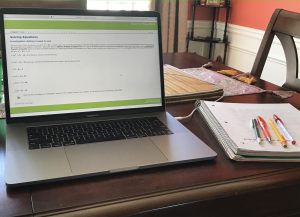Online Classes over the summer aren’t worth the hype
May 11, 2020
Virtual learning has taken over with the recent events happening in the world, and students have the option to continue on through registration for virtual courses over the summer. Students can register for these courses through Georgia Virtual School (GAVS) or Forsyth Virtual Academy (FVA), and essentially get an opportunity to get a required course “out of the way” and take courses that they care more about during the actual school year. While this sounds amazing in theory, the practical application of this leaves a lot to be desired.
Online classes tend to cost lots of money, in addition to any other fees like the cost of AP Exams or other review materials students need to buy. According to the GAVS website, the cost of a full-year high school course is around $500, which is only covered by schools if it is “part of the student’s regular school day,” so not including the summer. This isn’t much better in Forsyth Virtual Academy; the cost of a full credit course is only five dollars cheaper here. This creates an uneven playing field; students who can afford the cost of such courses may be able to get a lot of required online courses done over the summer and then take many APs during the school year, boosting their GPA. However, what about the students who cannot afford those costs? Money shouldn’t be a factor in whether a student can take a course or not, yet online summer classes make it one.
In addition, there is also the factor of paying this much money and not getting the full amount of education and knowledge the course can offer. These courses are extremely shortened; the fall and spring courses are up to 18 weeks long, yet the summer courses are only 5-6 weeks long. Taking a class that is supposed to be a year long and condensing it into a few weeks means losing the nuance of education, and not learning the essential materials needed for that course and any future courses that depend on the information in that course. GAVS says that “The shorter course lengths do not have condensed content. All of the same content is covered but at a faster pace,” yet how fast-paced is it? A single school year is around 36 weeks, so a GAVS course would have to go 6 times the pace of a normal school course in order to get all the information. Surely learning can’t happen at that fast a pace?
One of the biggest arguments for online summer courses is that they continue learning throughout the summer so you don’t lose the feeling of hard work and responsibility. However, there are many different ways to continue learning throughout the summer such as reading or studying for the ACT and SAT. Spending hundreds of dollars on an online course doesn’t seem worth it, especially when the learning is so crammed.
It makes sense to want to take some classes online over the summer, such as Health or to complete a pathway. However, when there is an option, taking classes in school over the school year seems to be the best for both the wallet, other students, and the students’ own education.





